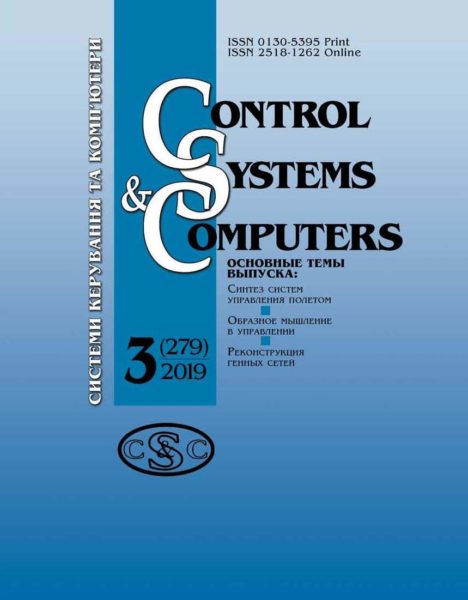Control Systems and Computers, N6, 2017, Article 1
DOI: https://doi.org/10.15407/usim.2017.06.003
Upr. sist. maš., 2017, Issue 6 (272), pp. 3-16.
UDC 338.24
Gritsenko Volodymyr I., Corresponding Member of the NAS of Ukraine, International Research and Training Centre of Information Technologies and Systems of the NAS and MES of Ukraine, Glushkov ave., 40, Kyiv, 03187, Ukraine,
Bazan Liudmyla I., PhD in Econom. Science, Associate Professor, International Research and Training Centre of Information Technologies and Systems of the NAS and MES of Ukraine, Glushkov ave., 40, Kyiv, 03187, Ukraine, E-mail: bazmil@ukr.net
Digital Transformation of the Economy
Introduction. The digital economy is seen as a communication medium for economic activity on the Internet. The main priority areas of the digital economy transformation and formation of digital economic space are the developments in the field of information, communication and computer technologies, large data technologies, cognitive technologies, artificial intelligence technologies, robotics, digital design and modeling, and digital transformations in the economic sectors. The main trends of the digital economy based on the use of cloud technologies, Big Data, additive technologies, artificial intelligence, mathematical modeling, digital design and modeling are investigated. In order to improve the management processes, it is necessary to develop an electronic document management system that is designed to automate all business processes related to the circulation of documents within the organization.
Purpose. The purpose of this article is to research the various economics that use information and telecommunication resources as their main source and their further transformation into digital space.
Results. A world experience in the digital economy transformation is studied. Ukraine’s readiness for digital transformation of the economy is considered. The main trends of globalization, their influence on the transformation processes in Ukraine are determined. The main measures are formulated regarding the problem of the Ukrainian adaptation to the globalization challenges and a strategy is defined in the field of foreign economic policy that is necessary for digital transformation.
Conclusion. The basic trends of digital economy transformation, taking place under the influence of globalization processes in the world, are defined.
Keywords: digital economy, transformation, trends, technologies, intellectual capital.
- SARGSYAN, T., 2017. The issue of the digital transformation of the economy is closely related to so many global challenges. [online] Available at: <http://finport.am/full_news.php?id= 28389> [Accessed 18 Apr. 2017]. (In Russian).
- SOBOLEVA, N.V., 2006. “New Economy” – Knowledge Economy and Globalization: Interrelation and Interaction”, Economics and Management, 4, pp. 108–112. (In Russian).
- CASTELLS, M. Information Age: Economics, Society and Culture, M.: GUVSHE, 2000, 608 p. (In Russian).
- ZELENOV, L.A., VLADIMIROV, A.A., STEPANOV, E.I. Modern globalization. Status and prospects, Sankt-Peterburg, Lenand, 2010, 304 p. (In Russian).
- SYUNTYURENKO, O.V., 2005. “Digital environment: trends and development risks”, NTI, Ser.1, pp. 1–7. (In Russian).
- KALUZHSKIJ, M.L., 2014. Marketing networks in e-commerce: an institutional approach, Berlin: Direkt-Media, 402 p. (In Russian).
- MARINA, E.Yu., 2016. “Digital space: the contradictions of becoming and development”, Young scientist, 9 (36), pp. 335–339. (In Russian).
- TEJLOR, F., 1991. Principles of scientific management. Library of the journal Controlling. Series “Classics of Management”, V1, Moscow. 104 p. (In Russian).
- SIMONS, HENRY C., 1948. Economic policy for a free society, Chicago. University of Chicago Press, 353 p.
- POLANI, M. Personal knowledge, M.: Progress, 1985, 344 p. (In Russian).
- DRESVYANNIKOV, V.A., LOSEVA, O.V., 2017. Human intellectual capital: theory, methodology and practice of evaluation, M.: RUSAJNS, 284 p.
- Information-analytical report “Analysis of the world experience in the development of industry and approaches to the digital transformation of industry of member states of the Eurasian Economic Union”, Moscow: The Eurasian Economic Commission, 2017, 116 p. (In Russian).
- In Singapore, Britain, New Zealand and the UAE – the highest level of development of the digital economy. [online] Available at: <http://www.finmarket.ru/database/ news/4566871> [Accessed 1 Feb. 2017]. (In Russian).
- Digital Economy of Singapore. The creation of the economy of the future and the initiative “Smart Nation”. [online] Available at: <http://www.rsbctrade.ru> [Accessed 1 Feb. 2017]. (In Russian).
Received 10.12.2017



